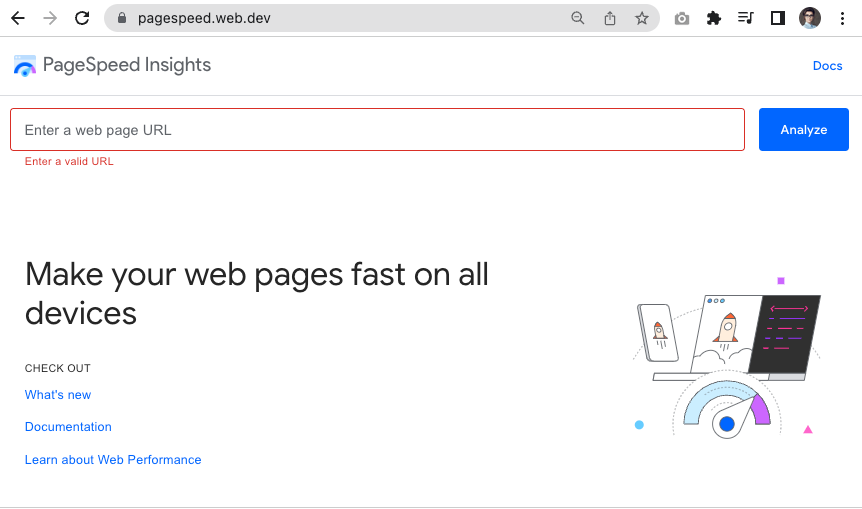How much does a website cost? The cheapest websites created in the DIY (do it yourself) formula can cost very little — we're talking about a monthly subscription cost of around $6.
The most expensive sites that also accomplish even the most strict business goals can cost between $17 700-$44 000.
The diversity of the market is large, but we'll do our best to explain where the differences in websites' quotations come from, and we'll recommend a suitable buying strategy depending on business conditions.
What influences the quotation of a website?
Let's start from the beginning. Before writing this article, we performed a little experiment specifically for you. We checked what the Internet would tell us if we wrote into the Google browser the inquiry "how much does a website cost." We've received a considerable amount of articles in which it was aptly noted that the price of a website depends on many factors :)
The authors of these articles state that the size of a website, the number of functions, and their complexity are the main factors that differentiate its quotation. We agree with them. However, in our opinion, that's not all there is to it. One more dimension is missing from the price ranges presented in these articles.
Namely, it's the type of technology used to create a website. After all, to what extent a site can accomplish assumed business goals depends on the technology. Some technologies will be more supportive than others. So to have a complete picture of this matter, we'll also look at this issue in today's article.
Let's go back to our experiment. The good news is that you don't have to read all these articles. Below, we compared the results of our research regarding the question, "how much does a website cost."
Essentially, you have three options for creating a website
First option. Do it yourself (DIY). Website Builder.
Second Option. Commissioning a website developer. WordPress CMS approach including a theme.
Third option. Commissioning a website developer. Custom Development approach.
We like interesting comparisons, so we'll explain these options based on the example of the housing market.
The first option — DIY — is like renting a flat. You don't own it, so you can't manage it. You don't have an influence on the decisions made by property owners. You can't renovate. The owner may decide that you should leave the flat.
The second option. You buy a flat from a developer. You can additionally purchase various available options, e.g., parking space, additional room. You can furnish and arrange as you wish but with some limitations. For example, you can't change the layout or room dimensions, the height of the ceiling, or the size of the windows. Customization options are limited.
The third option. Design your own dream home, perfectly tailored to your needs and taste. Choose any functions. Select the technology and materials.
In the case of professional entities with documented experience, we found out that the current prices in 2024 for the comprehensive creation of a new website with a division by its type look as follows:
How much does a website cost? Pricing of websites in 2024.
| The number of unique views | Examples | Ready-made theme | Ready-made theme + CMS | Custom design | Custom design + CMS |
|---|---|---|---|---|---|
| 1 | Landing page | 300-600 | 600-1100 | 800-1300 | 1100-2200 |
| 2-8 | Company website | 400-1000 | 1000-1600 | 1600-2200 | >2600 |
| 5-10 | Small online store | - | 1100-1600 | - | >3300 |
| >10 | Web portal | - | 2600-4400 | - | >7700 |
A unique view is not the same as the number of subpages. For example, a site can have four unique views (home page, contact tab, blog, article template), but it can have 40 subpages (home page, contact tab, blog, and 37 articles).
Below you can find the overview and detailed description of each option. Stay tuned! We guarantee lots of valuable information!
First option. How much does a DIY website (do it yourself) cost?
Website builders make it possible to create websites without the knowledge of designing and programming. Templates (themes) available on a website builder's platform are already designed, and with the function "drag and drop," you can shift its elements to a certain degree (images, text fields, etc.).
Advantages and disadvantages of website builders
Using a website builder (e.g., Wix, Webly) is the cheapest option for making a new site. It's characterized by the following:
- Cheap websites, so the entry threshold is very low
- Quick execution, from an idea to launch
- Lack of influence on the way of working of provided functions — they're designed a certain way, and nothing can be changed
- Various hidden costs can occur (e.g., a commission of 2.5% on the sale of each ticket, additional fees for google analytics)
- Statistically low-performance results, resulting in low visibility in Google's search results (despite large investments in website positioning)
- Lack of influence on the server infrastructure (e.g., due to the promotional campaign -20% on products, 5000 users enter the site, and they want to purchase). The website builder's platform, due to sudden overload in the infrastructure, can limit the operation of the website or even shut down the whole site until the traffic stops
- Lack of influence on security mechanisms used by the provider of the website
- Inability to use a data-oriented approach which results in the lack of the ability to automate content swapping on the site. For example, a change of a service name occurs, and to change it on the website, you need to check all subpages and manually edit it on each of them
- Lack of ownership of the site's source code — the website on Wix is not an asset of the company and thus doesn't increase the book value of the company
- Absence of advice from an interactive agency
- Website builders know how to maintain a customer, so they have mechanisms that make it difficult to move content (moving it to your own architecture is impossible).
The market leader in SEO platforms — Ahrefs portal — conducted an analysis that examined how many websites created in Wix technology achieved 100 or more organic traffic (organic traffic = a user encountered a website through results displayed by internet browsers, and it wasn't marked as an advertisement). More than 6.4 million websites were included in the analysis. The results state that a mere 0,06% of examined sites based on Wix achieved more than 100 organic traffic within a month!
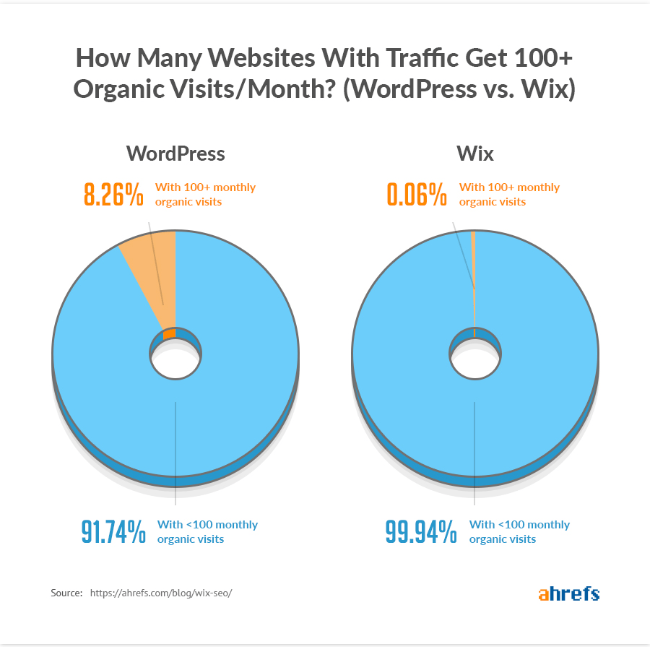
When it's worth using a website builder?
We recommend using a website builder when:
- The budget is heavily limited
- There is no need to use fancy features
- There is no need to often swap content on a site
- You don't plan to significantly expand the website
- There is no need for a graphic design that would strongly compete with other companies
- You don't care about visibility — the site only serves to give credibility when somebody visits by recommendation.

To sum up, creating a site with a website builder is a good solution for microsites, showcase websites, and sites that were quickly made to test an idea for a business where the level of complexity is low, and you don't plan to quickly expand or achieve high visibility results.
How much does a DIY website cost?
For an online store, the net cost of a basic monthly subscription is $30. During the first year, the domain is free.
- Adding PayU transactions costs 2,25% +$0,30 for each transaction, and costs for Przelewy24 can differ.
- Integration with a delivery function is possible, for example, through an external integrator, and this function also needs to be additionally bought. The price depends on the number of orders; e.g., for 1000 monthly orders, the cost is $70.
- Issuing invoices — currently, it's impossible to add the TIN field.
Second Option. How much does a website that was commissioned to a professional entity cost? WordPress approach, including a theme
When selecting a website developer, you will choose between a multi-talented freelancer and an interactive agency.
Most offers collected during our experiment were from interactive agencies for websites based on WordPress CMS. Quotations below $1600 consist of websites primarily created on ready-made WordPress themes, where an interactive agency configures the environment and chooses a suitable for the business theme, adds images, and publishes received content. Quotations of $1100-$3300 include the work of a graphic designer who adapts the general theme to guidelines. With $2200-$7700 price ranges, you gain a website created with a more or less rigid theme of an interactive agency which, over the years, developed a determined number of themes and continues to reuse them between designs.
When choosing this approach, you should be aware of the following:
- Usually, there is no place for an agency to analyze business needs thoroughly, and it only focuses on quickly adapting the website theme to the client's brief.
- In the case of such designs, it's possible to receive an upfront quotation because the interactive agency knows its theme.
- A frequent practice is to give a client a determined number of corrections to the developed theme (content swapping, color change, image change).
- All extra functions not included in the theme (pricing calculators, integrations, document generators) will raise the website development cost and move the quotation toward the third option.
- Websites based on WordPress are by nature template-oriented and not data-oriented, and thus, editing one piece of information in CMS (e.g., change of a service's name) on multiple subpages requires manually finding it and changing it.
- Using a data-oriented approach in WordPress is possible but not standard. Adding it moves the quotation toward the third option. The cost of design adaptation to a data-oriented approach can even exceed the price of the third option.
- WordPress, on the one hand, consists of quick plug-ins that expand a site with functions and, on the other hand, lower the security level.
- Expanding a website with plug-ins usually leads to a decrease in the website's efficiency and, thus, to a general decrease in performance and positioning in Google browser.
A few words about WordPress and maintenance costs
WordPress CMS is very popular. In 2023, it was reported to have a 43% market share compared to other CMS systems. WordPress is an open system, and it's easy to expand with various functionalities based on available plug-ins.
The openness of the WordPress ecosystem is, on the one hand, an advantage because functions can be quickly (and thus cheaply) selected in a marketplace available on the platform. On the other hand, it's a disadvantage as these plug-ins considerably lower security. Why does it happen? Plug-ins aren't controlled in any way, even the commercial ones. So you can never be sure whether a given plug-in is well-written, whether its installation won't cause a malfunction on a site or a loss of data, or that it won't introduce a security gap within a website.
Every minute there are at least 90 000 attacks on WordPress websites, and the greatest threat is plug-ins which constitute 55% of entry points for hackers.
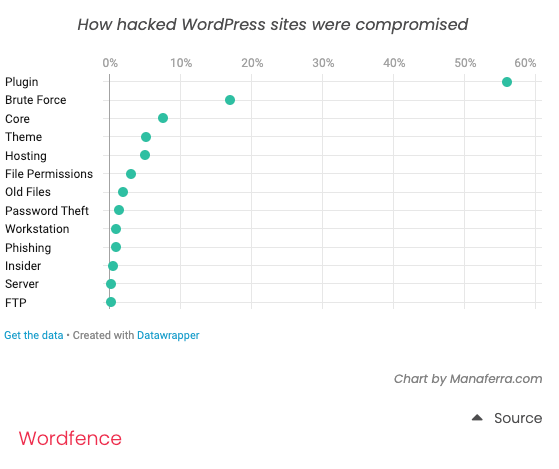
Another aspect is the maintenance of a website with this technology. Due to frequent attacks through plug-ins, maintaining a site on WordPress is one of the most expensive solutions because all plug-ins must be continuously updated to ensure a sufficient level of security. Frequent updates of plug-ins and WordPress tie you to an agency for longer than necessary to create a new site. That's why an interactive agency offers post-completion subscriptions for maintaining such a website.
Is it easy to change a WordPress developer?
Let's look at WordPress from the perspective of a development team. WordPress is technologically outdated, and additionally, it's written in PHP, a programming language that is passe among programming languages. Moreover, WordPress websites are seen as cheap sites, so clients expect low prices and costs of execution. Therefore it's increasingly harder to find a good specialist who develops their abilities in WordPress and is available.
The vast majority of WordPress teams include developers with short experience who only begin their careers in coding. This problem currently affects many medium- and large-sized companies that chose WordPress and can't find experienced developers. This leads to a situation in which a client is responsible for the maintenance process and decides to create their own development team.
The chart below presents which programming languages were selected for creating software over the years. As evident from the presented data, PHP, year after year, sees declines. We wrote more about the job market for WordPress programmers in the article "Django vs. WordPress? The job market for programmers."
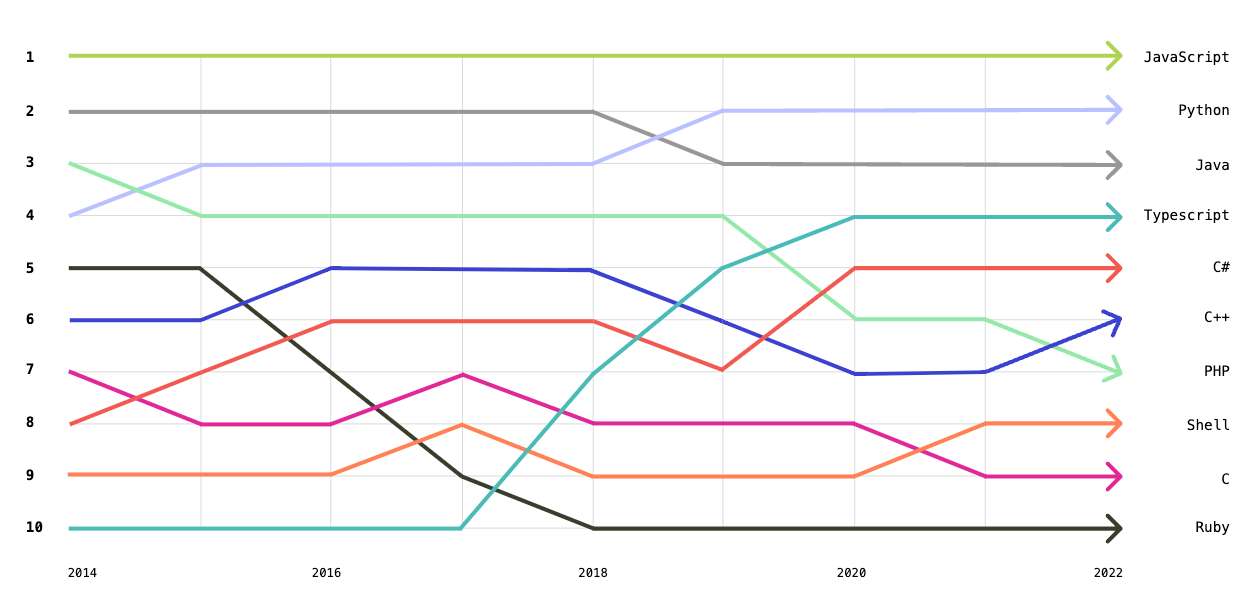
Third option. Commissioning a custom website
The third option is an entirely individual approach to website design. Let's look at company websites. In this approach, which is also often called a "tailor-made approach," developers start working with a client by exploring in depth the following:
- Business needs and business goals related to them
- Profile of the target audience of a website (personas) and their needs.
Professional developers in the initial phase of a design conduct a so-called Discovery Phase in which a design team, in an orderly manner, analyzes the stakeholders' requirements. This phase aims to unambiguously formulate guidelines that the team needs to meet. A professional website should have the requirements written down in the form of a structured website specification that both sides of the project should accept. Such actions minimize the risk that the final result will differ from business expectations.
The owner of the project (often the business owner) and the representatives of relevant departments (from the business owner's side) should participate in a workshop for formulating the website specification. These departments can include marketing, sales, or IT. Collecting requirements from various stakeholders isn't easy.
Sometimes it's necessary to juggle conflicting expectations; thus, leaders of a workshop must have confirmed facilitation skills that shouldn't be confused with a scrum certificate. In Poland, there are only two accredited schools of facilitators (School of facilitators Wszechnica UJ and Pathways) in which the education ends with a certificate recognized in the market.
A professional website doesn't have to mean a significant jump in price. A professional developer specializing in custom development offers personalized graphic design and a process that needs to be competitively priced compared to other players in the market.
How much does a custom website cost?
According to our experience, professional tailor-made websites (not made with a template) cost between $6600-$17700. This price discrepancy comes from the complexity of functional requirements that define the amount of workload. Custom-oriented teams provide a considerably broader scope of competencies, that's a significant advantage of their offer. We're talking about services such as business consulting, market analysis, branding, concept design, user testing, web visibility strategy, UX writing, and competencies regarding cloud solutions (AWS, Azure, Google Cloud). The technology itself is also crucial. Below, we present an overview of factors influencing the website cost.
Factors influencing the website cost
Although every website should fulfill the goals of its owner and serve the needs of visiting users, their quotations may range between $6600 and $17700 and more (the sky is the limit).
The final quotation of a site will depend on many factors.
The complexity of a website's design, its functionalities, and their complexity
The more advanced and personalized customer requirements, the more likely it is that the agency will have to create such a function from scratch, and thus the cost of website development will increase.
The expected level of a website's design attractiveness
A template and static sites can have an informative function. You don't need a designer; all it takes is a programmer who will choose an appropriate theme and edit the content. The situation looks different when a website is supposed to draw attention and distinguish a company from its competitors, be memorable, and strengthen with its elements the interaction with a user and direct them to take specific action with an interface.
Interfaces equipped with moving elements (e.g., the color changes along with scrolling) or animations will require the advanced skills of a UI designer and a frontend developer.
Branding implementation
Do you have beautiful and distinctive branding? An appropriate implementation of branding also influences the cost of a website. The correct unfolding of visual identification in a graphical interface is a task for an experienced designer and a frontend developer.
Responsiveness and adaptation to mobile devices
Today, it's a must-have. Nevertheless, it's worth discussing with a developer how they understand responsiveness, whether they implement it according to the Responsive Web Design or Adaptive Web Design. Does their price include only versions for desktops and smartphones in a vertical orientation, or do they also deliver websites in other dimensions?
Standard resolutions in 2024 include 1440px width for desktops and 375px for vertical orientation for smartphones. However, there are some businesses where in-between dimensions are popular: 420px for vertical orientation, 768px for a vertical tablet, and 900px for a horizontal tablet and mini-laptop.
A huge trend is wide screens with a width over 1900px. Each screen dimension is an additional breakpoint that needs to be designed and coded for all designed views of your site.
What content management system (CMS) will the website have
A CMS system makes it possible to edit a website's content without programmers' involvement. A custom website can still be based on WordPress, but a professional team will take care of increasing security and optimization. It will propose a headless architecture, which will make the CMS communicate with the site's visual layout (frontend) through API.
Which CMSes indicate that a site will be custom? These include data-oriented Django Admin — Django CMS based on Python — and Strapi based on Node.js. All these CMSes are open source and can be used and developed for commercial purposes based on free licenses, and they also have a massive community of developers. For example, Django is officially used by organizations such as NASA, The New York Times, and The Guardian. Simultaneously they're cheaper and faster in terms of implementation than the mentioned WordPress. We wrote more about it in the article "Applications developed in Django. Which companies use Django?".
The additional advantage of Django and Strapi is the fact that finding professional developers in their case is much easier than in the case of WordPress, where everybody vouches for their professionalism, and the truth comes out in more complex tasks entrusted to the agency. We wrote more about this in the article "WordPress vs. Django. What to choose for a corporate website?".
Designing with future website positioning in mind
If a website is supposed to attract users from free Google search results, then already at the stage of designing, you should take care of appropriate website structure, organization of content, and internal linking. It's not an easy task and requires practice. That's why you should ensure that the design team has relevant competencies when choosing a web developer.
Website performance
If you use a passive sales funnel, marketing model, and flywheel marketing in your business, you should care about high visibility, performance, and considerable traffic. The only solution that can achieve this is the tailor-made, custom solution. Are you working by recommendation? Are you attending conferences, giving out business cards, and expecting that a website will only make you and your company more credible? You will only need a showcase site and a website builder.
The technology used for creating a website
The website development cost depends on the selection of technology, which is determined by the business goals of the client. Visibility and performance are influenced by frontend technology, architecture, and server infrastructure. The CMS and back-end technology will determine the convenience of using CMS and the standardization of work on the content.
On the other hand, software architecture will affect everything a little — performance, CMS, security, and development costs. The most common sites on the market are made in a monolithic architecture. A decent website is based on a headless approach or microservices architecture.
Security requirements
A website with security requirements and a site without particular requirements but still safe will have two different quotations.
We saw how much the level of complexity can grow on an example of a certain tender. Before our eyes, the cost of a website increased from $13200 to $77000 when the client included a requirement regarding ISO 27001 certification (international standard regarding information security management) in the specification. One requirement narrowed down the number of potential developers to 3-5 entities that would be able to meet it. However, the customer stood their ground.
Another example is the requirement of so-called penetration testing. There are situations in which the development of a site ends in a simulated cyberattack. Such an authorized attack aims to find security gaps and introduce fixes that will prevent losses in the future.
The use of external services by a website
The website cost can be surprising when it uses external solutions, e.g., Google Maps, for searching, filtering, and presenting content on a map. Incorrect implementation of integration with Google Maps by an interactive agency can cost from a few to several thousand dollars paid monthly by a client to Google.
Or even something as simple as a font used by a designer. The price for a license to use a font on a site can depend on the number of user visits, and the website developer should inform about this during the presentation of their work results.
Website development time
Developers have various project execution times. When analyzing the time, it's worth remembering that developers work under the pressure of clients and the market. The website development time is influenced by the types of a site and an array of requirements that we've mentioned in this article. Nonetheless, developers try to provide a time of 2-3 months, as this is what customers expect. For a custom website, development time should be between three months and more. Shortening this time will negatively influence the cost of a site.
Legal terms of cooperation
Legal terms of a contract influence the ultimate cost of a website. Should you have your own website (custom) or rent one (builder)? Should you have rights to the source code? Some developers offer low prices for a site but compensate themselves with customer support and development.
The website cost can also be influenced by less obvious clauses included by a developer in the contract. In such a situation, you have a reasonable price for a site, but the final cost can surprise you. It can include additional compensation for delays on the client side, e.g., delivering source materials, lack of software testing, low code quality, additional fees for meeting legal requirements in terms of GDPR, or faster website development time.
A less obvious but still occurring expectation in queries is the requirement to store user data in specific regions, e.g., Poland or in second place, according to popularity, in China in the case of businesses looking for potential clients there.
Cooperation models (fixed price and time & material)
A company website or even an elaborate company website based on themes can be quoted using a fixed price model. However, when selecting this model, the client should know that the developer will consider risks and include them in the quotation. Thus, ensure that the contract states how many corrections you can implement and how much you will pay for additional work if you exceed this limit. We wrote more about this in the articles "How to choose the right custom software development company to work a fixed price contract" and "Website functional specification example. Hiring a web development company for a fixed price."
Are website prices rising?
According to law firms handling IT contracts in 2024, the escalation clause in contracts has become a mandatory point for most Polish developers. The cost of website development has increased compared to 2022. Inflation spares no one, especially the IT industry.
The increase in website cost directly stems from the rise in compensation for specialists and the cost of external services and licenses essential for executing projects by developers.
How much does a website cost in The Story?
How much does it cost to develop a site in our company? We'll eagerly answer you when you will send a request for a quotation. Send it right away to tell[@]thestory.pl.
We specialize in the third option, that is, we create tailor-made websites. In short, we deliver you a custom design. Our specialty is sites that meet high-performance requirements. We are an excellent choice when you want a thoughtful design, a high conversion rate, passive sales, high visibility, and considerable traffic (website positioning).
In response to your request, you will receive a detailed quotation and recommendations regarding technology and architecture. We'll collect requirements regarding your websites and adapt the quotation to your needs. We'll surprise you with the content of our offer and how much you will gain by cooperating with us.
When you send an inquiry through your company's e-mail address, you will receive a checklist that will make it easier to formulate the requirements needed for the quotation request and comparison of developers' offers.
How to compare offers from developers?
We'll explain this using an example of a project we developed, "Wiadomości spożywcze." The primary goal of the business owner was to design a website, information portal to achieve high visibility on the Internet and strengthen the company's image compared to competitors.
Besides matters related to the UX of supported functions, or branding, we also had to take care of important technical issues to achieve the highest visibility possible in the Google browser (quality of the source code and Web Core Vitals).
A checklist for comparing website developers
If you want more than just finding the cheapest option, we have prepared a checklist for you to compare website developers. You should check the following:
- General aesthetics of the developer's website and its content. If a developer's website is not attractive, then it's a guarantee that they won't be able to make your site appealing.
- If a developer's website is aesthetically pleasing and has attracted your attention, check the developer's portfolio. If it's unavailable, it may not be worth the risk. If the presented work is intriguing, then you can continue.
- You can go ahead and ask for contact to check their testimonials. Unfortunately, opinions on the Internet can be fake. Only a few catalogs verify whether the opinions are honest; that's why nothing will replace a discussion with other clients of a developer.
- Ask how many people will be on a design team and what skills they will have. Will the team include people with experience in UX writing, SEO, UX design, UI design, development, and animation?
- If you recognize the websites from the developer's portfolio, check the quality with PageSpeed Insights.
- The visibility of the website of a potential developer :) If a developer wants to sell you the service of creating a website that will have a high position and their site can't be found among the Top 10 search results, then ask yourself why.
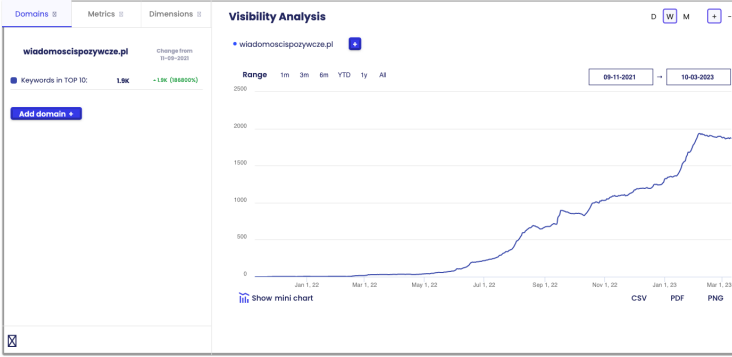
https://pagespeed.web.dev/ is a tool for examining the quality of websites. You need a website that will be visible on the Internet, and a developer ensures they have skills for that. Go to the mentioned site and check the developer's website performance with PageSpeed Insights. The loading speed of a site is one of many elements of Web Core Vitals influencing the positioning of a website.
Why is it worth cooperating with a professional agency to create a website?
Cooperation with a professional agency during website development brings many benefits. Namely, the following:
Experience and expert knowledge: Professional agencies have experience in creating diverse websites for various industries and clients. They have specialized knowledge and skills that enable them to adapt the design to your personal needs and goals.
Individual approach and consulting: Usually, agencies work on a website design by cooperating with a client. Before they start the project, they will analyze your requirements, business goals, and expectations. Based on this information, they can advise you and propose the best solutions to suit your budget.
Professional appearance and functionality: Agencies aim to provide your site with a professional appearance and functionality. They can create an aesthetically pleasing design representing your brand well and attracting users. Additionally, agencies can ensure extensive functions such as responsiveness for various devices, optimization for browsers, and integration with external systems.
Scalability and flexibility: Professional agencies have the resources and skills to handle projects of varying scopes and complexity. Whether you need a simple landing page or an advanced web application, an agency can adapt to your needs and provide suitable solutions.
Technical support and maintenance: An agency can provide technical support and maintenance after deploying the website. They can handle updates, monitor performance, solve technical problems, and ensure the website's security. This allows you to focus on running the business, and an agency will take care of technical aspects.
Continuation of cooperation: Cooperation with a professional agency for creating a website can be the beginning of a long-term business relationship. An agency can offer additional services such as online marketing, website optimization, or mobile application development, allowing you to develop your site, adapt it to changing needs, and make decisions based on the developer's experience.
How much does a website cost? Summary
The website cost grows along with the business goals and criteria that it should fulfill. It seems obvious, but it's even more interesting that when you start to require more unusual functions, you automatically move from the second option to the third option. Therefore, it's essential to predict already at the stage of submitting the project for quotation whether you will need more complex functions now or in the future.
Disclaimer
The sample prices presented in the article do not constitute a commecial offer within the meaning of the Polish Civil Code.


